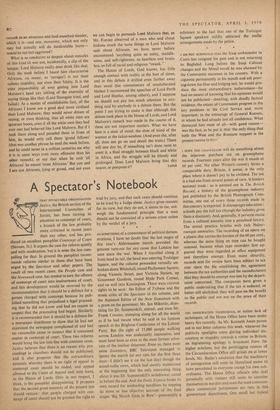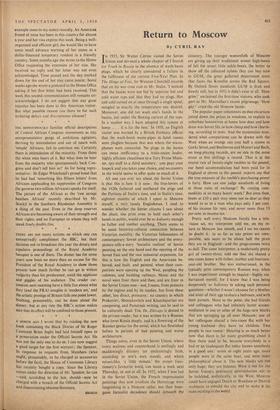1 AM NOT SURPRISED that the Iraqi ambassador in Cairo
has resigned his post and is not returning to Baghdad. Long before the Iraqi Cabinet changes and the Mosul revolt he was alarmed by the Communist successes in his country. With a cigarette permanently in his mouth and ash pour- ing down his blue and bulging suit, he would pro- duce the most extraordinary indiscretions—he had no means of knowing that his opinions would not be publicised—detailing, with deadly factual evidence, the extent of Communist progress in the key positions in the Civil Service and, more important, in the entourage of General Kassem, in whom he had already lost all confidence. What dismayed him most of all—with good reason— was the fact, as he put it, that 'the only thing that both the West and the Russians support is the present regime in Iran ' HOPE THE CHANCELLOR will do something about the injurious purchase tax on gramophone records. Fourteen years after the war it stands at 60 per cent. No other Western country levies a comparable duty. Britain, it seems, is the only place where it doesn't pay to be civilised. The tax is a bad one from several points of view. It hinders national trade : as is pointed out in The British Record, a history of the gramophone industry just published by the British Phonograph Com- mittee, one out of every three records made in this country is exported. It discourages education : schools pay the full tax (though the industry gives them a discount). And, generally, it perverts music from a cultural amenity into a penalised luxury. The actual practice bristles with rich Nabar- roesque anomalies. The recording of an opera on a plastic disc carries the burden of the 60 per cent., whereas the same thing on tape can be bought untaxed, because when tape recorders first ap- peared they were regarded as office equipment and therefore exempt. Even more absurdly, records sent fOr review have been subject to tax ever since the file establishing the agreement between the tax authorities and the manufacturers that they should be exempt was lost by the depart- ment concerned. The companies have given a public undertaking that if the tax is reduced, or better still abolished, they will pass on the benefit to the public and not nut up the price of their records THE IMMIGRATION TECHNIQUES, or rather lack of techniques, of the Home Office have been under heavy fire recently. As Mr. Kenneth Ames points out in our letter columns this week, whenever the publicity spotlights some glaring individual dis- courtesy or stupidity towards a visitor to Britain, an ingratiating apology is broadcast from the higher echelons, but the pettifogging routine of the Circumlocution Office still grinds on at lower levels. Mr. Butler's assurance that the machinery of immigration will soon be liberalised seems to have percolated to everyone except his own sub- ordinates. The Home Office officials who deal personally with visitors still seem to consider themselves as warders and even the most common- place commercial politenesses are rare in this government department. One small but typical example came to my notice recently. An American friend of mine has been in this country for almost a year and her visa expires this week. Being a well- organised and efficient girl, she would like to have some small advance warning of her status as a dollar-financed temporary resident in a friendly country. Some months ago she wrote to the Home Office requesting the extension of her visa. She received no reply and her letter was not even acknowledged. Time passed and the day marked down for the end of her stay came nearer. Some weeks ago she wrote a postcard to the Home Office asking if her first letter had been received. This week this second communication still remains un- acknowledged. I do not suggest that any great injustice has been done to this American visitor. But what possible reason can there be for such irritating delays and discourteous silences?



































 Previous page
Previous page